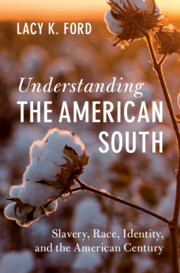Refine search
Actions for selected content:
6 results
1 - A Twenty-First Century Meaning for the American Civil War
- from Part I - Understanding the American South and the Civil War in a New Century
-
- Book:
- Understanding the American South
- Published online:
- 05 December 2024
- Print publication:
- 12 December 2024, pp 13-36
-
- Chapter
- Export citation
4 - The “People of Plenty”
- from Part II - Understanding the South and the American Identity
-
- Book:
- Understanding the American South
- Published online:
- 05 December 2024
- Print publication:
- 12 December 2024, pp 89-112
-
- Chapter
- Export citation
5 - The Problem of Slavery Reconsidered
- from Part III - Understanding Slavery, Race, and Inequality in the American South
-
- Book:
- Understanding the American South
- Published online:
- 05 December 2024
- Print publication:
- 12 December 2024, pp 115-138
-
- Chapter
- Export citation
3 - The “Genius of American Politics”
- from Part II - Understanding the South and the American Identity
-
- Book:
- Understanding the American South
- Published online:
- 05 December 2024
- Print publication:
- 12 December 2024, pp 66-88
-
- Chapter
- Export citation

Understanding the American South
- Slavery, Race, Identity, and the American Century
-
- Published online:
- 05 December 2024
- Print publication:
- 12 December 2024
Chapter 5 - Source, Original, and Authenticity between Philology and Theology
-
-
- Book:
- Classical Philology and Theology
- Published online:
- 03 September 2020
- Print publication:
- 17 September 2020, pp 86-109
-
- Chapter
- Export citation
